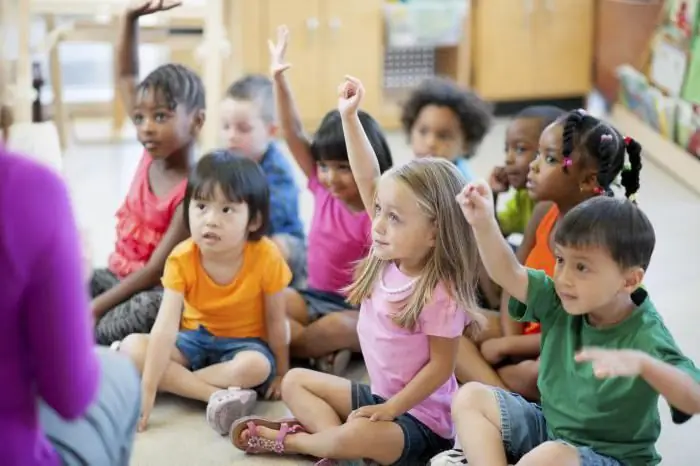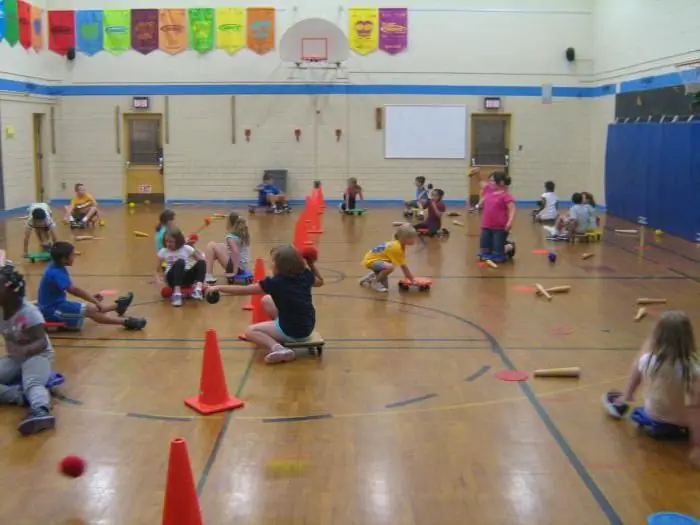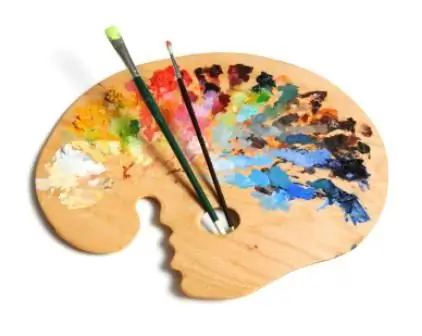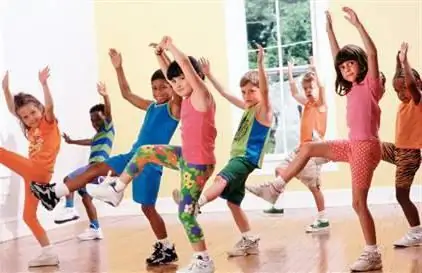2026 Author: Priscilla Miln | [email protected]. Last modified: 2025-01-22 17:55:22
Physical leisure is called physical exercises performed by children in a playful way. All activities are entertaining. They are aimed not only at the physical development of the child, but also at receiving positive emotions. Such qualities as discipline, a sense of collectivism and purposefulness are also brought up.

Features of classes
In preschool institutions, physical education in the senior group is held several times a month in the afternoon. Such classes take place on days of the week when there is no physical education, otherwise children can overwork. Leisure topics depend on the kindergarten's annual plan.
The subject of physical education, venue and participants are prescribed precisely in the long-term plan of the preschool institution. After the head of physical education has familiarized himself with the documentation, he draws up a program for each lesson based on the individual characteristics of the children, their age and the conditions provided by the institution. Important point:physical culture leisure in the senior group is not educational. Therefore, when planning it, one should proceed from what the children have already been taught, and reinforce these knowledge and skills during the lesson.

What to consider?
Physical leisure in the senior group is planned on the basis of the educational material that the students have completed. Games and exercises performed by children should be varied, that is, you should not use too simple actions, as they will not develop the child's motor skills. As with any physical training session, the difficulty will increase from the very beginning of the session, and must decrease at the end in order to restore the body after the load.
Physical leisure in the senior group "Funny ball" is organized in such a way that children have a constant emotional upsurge. For this, games and exercises alternate in such a way that the occupation is constantly changing. If all the games, for example, are inactive, then the children will quickly get bored, their interest will disappear. Important details of any physical culture leisure are participants' costumes, emblems and other paraphernalia. All this creates a special atmosphere that children love.
Sample Topics
Physical leisure in the senior group is divided into several types:
Cognitive serve the development of mental abilities. Children perform a variety of tasks in which you need to be quick-witted. Entertainment activities include "Funstarts" and other similar games, relay races and competitions. Classes sometimes contain an element of moral and patriotic education. Parents can participate in them. An example topic: "Dad, mom, I am a sports family."

Classes can also be devoted to he alth in general. Scenarios of sports activities and holidays usually do not differ in their structure, only the external design changes.
Small but important details
The inventory used should be selected taking into account not only its belonging to the topic of the lesson, but, more importantly, from the point of view of safety of use. After all, during sports leisure, a variety of situations can occur in which equipment can pose a danger to the he alth of pupils.
The choice of music is based on its popularity among kids. Melodies from children's cartoons, popular songs and classical music are the best option. Winning competitions is also very important. If we say that friendship has won, and do not single out anyone, as many educators and teachers love, then after such words, each child loses interest in various competitive games and in the lesson in general.
Activities involving parents
One of the main goals of involving parents is to awaken their interest in communicating with children. Physical culture leisure in the senior group occurs approximately according to the same plan. It includes the construction of parents and their children, after which it is pronounceda welcoming speech by the teacher (in poetic form), and in order to raise the emotional mood, a relay race is arranged. Both kids and adults take part in it, jointly performing various tasks.

A typical variant is "We are athletes". Physical education in the senior group includes several relay races, tasks with riddles and exercises with elements of gymnastics.
Conclusion
So, the main goals of physical education:
- creating an environment conducive to interaction between children;
- cultivating interest in exercise and a he althy lifestyle in general;
- building communication skills.
These activities consist of an introductory part designed to spark interest in the children and get to know each other better, a main part containing relay races, games and quizzes, and a concluding part, during which the children recover from the load.
Recommended:
Physical activity in the middle group: exercises, inventory, equipment

Physical education for children is extremely important. They carry not only an entertaining purpose, but also teach to explore the world, give the necessary load on the muscles, and are the prevention of diseases. Any physical education lesson in the middle group and others must be built according to the Federal State Educational Standard
Physical education: goals, objectives, methods and principles. Principles of physical education of preschool children: characteristics of each principle. Principles of the system o

In modern education, one of the main areas of education is physical education from an early age. Now, when children spend almost all their free time on computers and phones, this aspect becomes especially relevant
What is leisure? Adult and children's leisure

Everyone in our time knows perfectly well what leisure is and what is characteristic of it. Therefore, in this article we will briefly consider the deep meaning of this term, as well as expand the ideas of many about how exactly this very leisure can be spent with the greatest benefit and benefit
Synopsis "Physical training in the senior group". Summary of thematic physical education classes in the senior group. Summary of non-traditional physical education classe

For children of older groups, many options for organizing a lesson are prescribed: plot, thematic, traditional, relay races, competitions, games, with elements of aerobics. When planning, the educator draws up a summary of thematic physical education classes in the older group. Its main goal is to show children how to strengthen and maintain he alth with the help of general developmental exercises
Sports leisure in the senior group of kindergarten

Kindergarten is a place not only for the mental development of kids, but also for the physical. How to organize sports leisure in the senior group? What activities to carry out? Should parents be involved in competitions?

